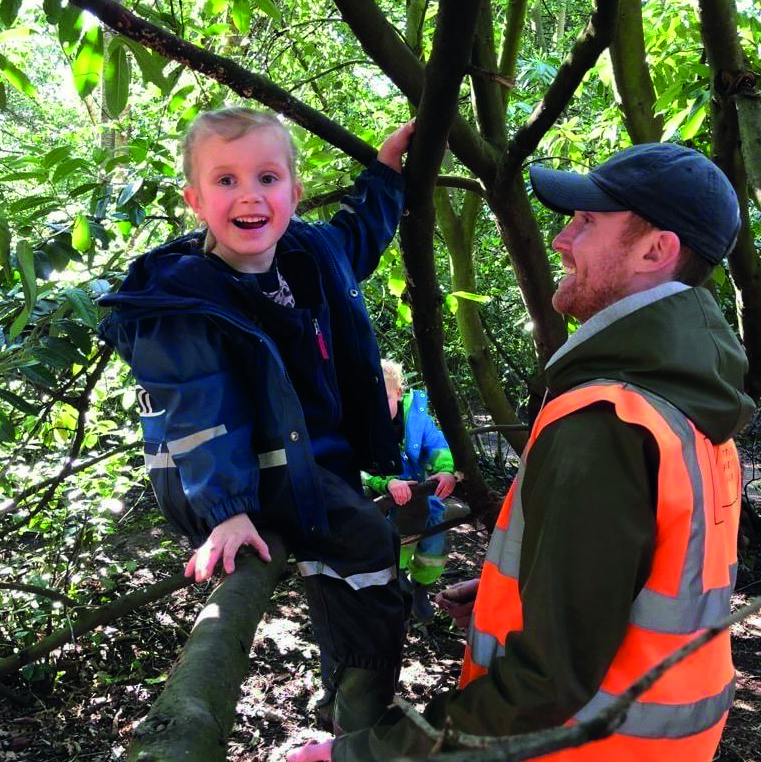
Lynn McNair, head of the Cowgate Under 5's Centre in Edinburgh, is struggling to think of a single indoor activity children cannot do outside. Based on a Froebelian ethos, the centre's garden doors are always open and children have the freedom to play wherever they wish.
‘Our children run barefoot if they choose to, no matter whether it's snowing,’ she says. ‘It really is a very natural, ecological kind of existence. We cook porridge outside. You can have woodwork, block play, or draw outside.’ Eventually she thinks of something: ‘I suppose there's not a piano outdoors.’
Being outside is so ingrained at Cowgate that Dr McNair says she would ask a staff member to leave if they were reluctant to spend time outdoors. ‘I wouldn’t want to ever compromise the experiences children have outdoors to appease staff.’
But she suggests it is easier for practitioners in Scotland to be dedicated to this vision because of the national government's endorsement of outdoor play. She has observed attitudinal difference among English practitioners.
The Scottish government's position statement declares: ‘We will work together to embed playing and learning outdoors as an everyday activity and we will celebrate it as a fundamental part of growing up in Scotland.’ The Scottish Care Inspectorate says it ‘supports care service providers taking a positive approach to risk in order to achieve the best outcomes for children. This means moving away from a traditional deficit model that takes a risk-averse approach.’
For early years settings to embed this level of commitment within staff, they must first set out a vision of what they want to achieve, says Muddy Feet Training founder Alex Williams. She recommends settings write down their own statement about the outdoors, which becomes part of their core business. To help engage any reticent practitioners, she advises taking steps to identify the barriers they believe exist, then write plans on how to manage them.
‘If it is weather, it's about having a plan for what to do in bad weather,’ she says. ‘Think about all those scenarios, so that you can prepare for them, and also set yourself targets. You don't have to be outdoors all the time. You can just spend a morning out three times a week.’

SHARED VISION
Ms Williams says hiring a professional facilitator to help identify barriers and decide how to use a space may seem like an unnecessary upfront cost, but this can save money in the long term. She also recommends getting all staff involved in creating the outdoor vision, and creating plenty of time for reflection after each session.
‘That's where the learning is: what was good, what was bad, what I do differently,’ she says. ‘But as they start to build up their experience, they could probably just do it once a month.’ Shared values, policies and practice are also recognised by Ofsted.
Leaders of London's Little Forest Folk nursery chain says training is vital when fostering an outdoor ethos among staff. Despite the fact that applicants to its seven settings know from the offset they are focused on the outdoors, operations manager Conor Williams says there are skills gaps for every practitioner. ‘Some people have spent years working in childcare, but not so much of the outdoor stuff, and that's what we need to focus on. For other people, it's the other way around and they’ve worked in outdoor pursuit centres.’
New staff are buddied-up with other practitioners for the first two weeks so they can be supported and trained on the job. Mr Williams insists training must be practical. ‘You can read a book about what the outdoors is like, or watch a programme on TV, but you don't actually form that connection unless it's been built personally,’ he says. ‘For our children, that's what they’re doing – they’re forming all these personal connections by jumping over streams and playing with crunchy leaves and climbing trees.’
Delivering early education sustainably is also integral to Little Forest Folk's vision. For example, one of its nurseries, based in the grounds of English Heritage site Chiswick House, moves base camp every two or three weeks to ensure the group is not over-using that patch of ground or nearby trees. Other sites capture and reuse rainwater to water plants in allotments. Settings make efforts to reduce food waste and the company buys biodegradable nappies.
‘The sustainability piece runs through everything,’ says chief operating officer Lisa Behan. ‘You’ve got people in the nursery looking at it from a nursery perspective. You’ve got role-modelling being used with the children and books. That's where it starts – developing a love of nature and having an inherent want to protect it.’
In April, the London Early Years Foundation (LEYF) launched the first Level 4 qualification for sustainability in early years education. Accredited by Cache, it encourages practitioners to take steps such as reusing materials and to decrease consumption of resources.
‘Sustainability needs to be a team effort and include all relevant parties,’ says LEYF Marsham Street Nursery and Pre-School senior manager and sustainability lead Nick Corlett. ‘This includes children, teachers, parents, as well as governance within the organisation.’









